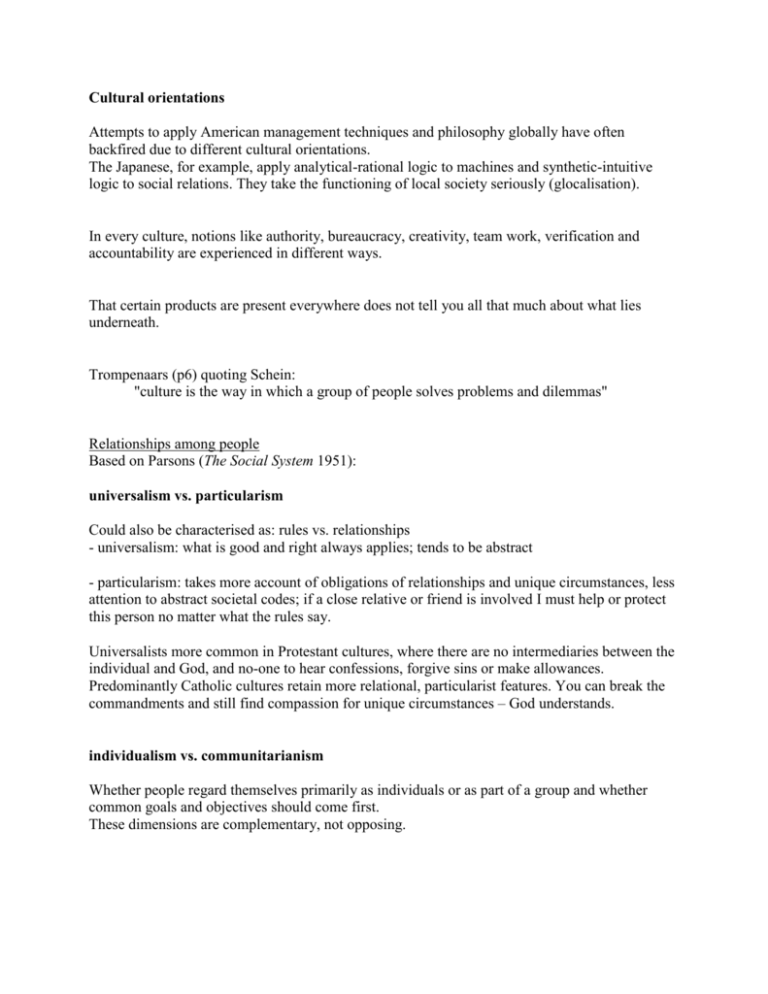Cultural orientations
advertisement

Cultural orientations Attempts to apply American management techniques and philosophy globally have often backfired due to different cultural orientations. The Japanese, for example, apply analytical-rational logic to machines and synthetic-intuitive logic to social relations. They take the functioning of local society seriously (glocalisation). In every culture, notions like authority, bureaucracy, creativity, team work, verification and accountability are experienced in different ways. That certain products are present everywhere does not tell you all that much about what lies underneath. Trompenaars (p6) quoting Schein: "culture is the way in which a group of people solves problems and dilemmas" Relationships among people Based on Parsons (The Social System 1951): universalism vs. particularism Could also be characterised as: rules vs. relationships - universalism: what is good and right always applies; tends to be abstract - particularism: takes more account of obligations of relationships and unique circumstances, less attention to abstract societal codes; if a close relative or friend is involved I must help or protect this person no matter what the rules say. Universalists more common in Protestant cultures, where there are no intermediaries between the individual and God, and no-one to hear confessions, forgive sins or make allowances. Predominantly Catholic cultures retain more relational, particularist features. You can break the commandments and still find compassion for unique circumstances – God understands. individualism vs. communitarianism Whether people regard themselves primarily as individuals or as part of a group and whether common goals and objectives should come first. These dimensions are complementary, not opposing. The individual as a concept appeared in the Renaissance (prior to that individuals defined in terms of family, clan, tribe, city state, feudal group. Strengthened by Protestantism, Romanticism, the Industrial Revolution. Modernisation: from Gemeinschaft, a family-based social context to Gesellschaft, a workplace of separate tasks and responsibilities. Question: does the Internet lead to more or less individualism? neutral vs. emotional Should interactions be objective, detached or is expression of emotion acceptable? In North America and NW Europe business relations are functional and objectives oriented. In many other cultures business is a human affair and all emotions can be expressed – these are known as affective cultures. In non-affective cultures it is seen as unbusiness-like to 'lose your cool' Humour, especially irony and understatement, may not be understood in many cultures. And the British habit of joking in all contexts is different to the German tendency to be serious in business/professional contexts specific vs. diffuse The relationship as prescribed by contract or by 'real', personal contact. The range of involvement: whether we engage others in specific areas of life and single levels of personality or diffusely in multiple areas and at several levels of personality at the same time. Psychologist Kurt Lewin (1936) represents the personality as a series of concentric circles with "life spaces" or "personality levels" between. The most personal and private are at the centre, the most shared and public on the periphery. He contrasted American and German types, with the former having more public than private space, segregated into sections (work, sport, church, associations/societies, neighbours, acquaintances, friends, family). American (British) personality friendly and accessible – letting someone into the public layer is not a big commitment. German (Slovene) life space harder to enter; private spaces larger and diffuse – once someone admitted they have wide access and bring status with them. Herr Doktor or Frau Doktor have this status in all situations; in USA/Britain a title (e.g. Professor, Doctor) is a specific label for a specific job in a specific place. Thus Germans/Slovenes may be seen by Am/Brits as 'closed' and hard to get to know, while the former see the latter as friendly, garrulous but superficial – you are let into a corner of their life and remain peripheral. The concept of loss of face is why it takes diffuse cultures longer to get to the point and why people takes things personally. Doing business with a culture more diffuse than your own can seem very time consuming (your business partner may want to know where you went to school, about your family, your views on life, art, politics…). Not a 'waste of time' as this reveals character and makes deception almost impossible. But if you are from a specific culture you can separate business or work from the rest of your life – everything is not connected. Specific and diffuse cultures are sometimes called low and high context: how much shared knowledge is taken for granted in communication, how much reference to shared common ground. High context cultures like Japan and France think outsiders need to be filled in before business starts; rich and subtle but carry a lot of 'baggage', hard for outsiders to feel comfortable. Low context cultures like USA and Netherlands think that outsiders should share in making the rules – adaptable and flexible. USA: management by objectives and payment by performance, but in diffuse cultures it is relationships that improve performance, not the individual. Diffuse cultures have lower turnover of staff and mobility; loyalty is important. Specific cultures headhunt people and people are expected to be mobile achievement vs. ascription How status is accorded - achievement: judged on what you have accomplished, your record - ascription: status attributed by factors such as birth, kinship, gender, age, social connections, educational record, profession. The former more associated with Protestant cultures (strong link between Protestantism and the development of capitalism; WASP in the USA) ; the latter with Catholic, Hindu and Buddhist cultures. Much business training assumes that individual achievement (and reward) is what matters. Ideas like performance-related pay and fast-track or management trainee programmes reflect this. What matters is 'getting things done' – at the expense of personal freedom to live as you feel you should. Role of titles: Trompenaars mentions how he carries three kinds of business cards, some with formal educational titles (for southern Europe and the Middle East), some without (for Britain, where academic titles and corporate culture do not go together). In the USA relevant academic titles are accepted. Ascriptive status carefully ordered in many organisations: for example, what kind of company car you receive or even the size of your desk attitudes to time Past achievement vs. future plans Time as linear / sequential (USA) or as circular / synchronic (Asian cultures): affects planning, strategy, and short- or long-termism In business, time is seen as something that must be managed: time and motion studies, just in time, product life cycle, etc. Time is also a social construct, enabling members of a culture to coordinate their activities. Different individuals and cultures may be more or less attracted to past, present or future orientations: Henry Ford's "History is bunk"; the future as destiny; nostalgia. In North America and NW Europe efficiency is associated with doing things sequentially, with a 'critical path'. Elsewhere, several activities may run in parallel (synchronic or polychromic). Members of sequential cultures schedule tightly: "I'm running late" and of course "Time is money". In synchronic cultures, punctuality is less important, or rather other cultural values may take precedence: if you unexpectedly meet a friend or relative or someone higher up the social hierarchy you may have to sacrifice punctuality because it is not acceptable to say "I can’t talk, I'm in a hurry". Meeting times thus approximate: from 15 minutes in Latin cultures to part of day or whole day in Middle East or Africa. In sequential cultures, the individual can affect the future though effort and achievement; expects quick rewards. Assessment and promotion linked to recent performance. Relationships may be seen as instrumental, as a means to a (short-term) end. Contrast between efficiency, following a specified schedule/order, and effectiveness or getting the result but being less worried about how you got there. Planning includes forecasts and trend lines; strategies consist of desirable goals and the logical means of achieving them; deadlines keep you 'on schedule'; if the situation changes everything needs to be replanned. In synchronic cultures there is more of an emphasis on the goals and the different paths though which you may achieve them. There is evidence that sequential planning is less suited to unpredictable environments and times: an alternative is scenario planning, where different scenarios are prepared for. attitudes to the environment Focus of life and vice or virtue (as well as motivation) comes from within the person, or the world/the environment is more powerful than individuals Some cultures see their role as subduing and controlling nature ("multiply and subdue the earth"); others see man as part of nature and must go along with its laws, directions and forces (Que sera, sera). The former are inner-directed and see organisations as more mechanistic; the latter are outer-directed and see organisations are more organic. In the 1960s the American psychologist Rotter saw success or failure as being linked to an internal or external locus of control; the extent to which you can control and be responsible for your own fate. Western though influenced by Copernicus and Newton: the universe like a vast machine wound up and left to run by God. Discovering the laws of the universe – time and motion – meant worshipping the creator. Done through hypothesis and deduction. In the 17th and 18th centuries man also came to be seen as a machine of sorts, the body controlled by reason. Quantification and measurement passed from the natural to the social sciences. Since the late 1960s, this has started to be questioned by the Green movement and the interest in Eastern philosophies – Gaia or Mother earth as a living thing rather than resources to be exploited. In the business world, pay for performance may be questioned in outer-directed cultures: customers may get overloaded with products they don’t want; moreover, it is wrong to blame sales people when things not going well – there are good times and bad times, these are inevitable trends. Does inner-directedness lead to a desire to control people's behaviour as well as the environment – to see people as means to ends? Shaping behaviour through incentives, trying to motivate. The HAY evaluation method judges people in terms of their function and how well they have discharged it. Feedback is seen as important but not as important as the original plan and its achievement – it is a way of maintaining the direction.






